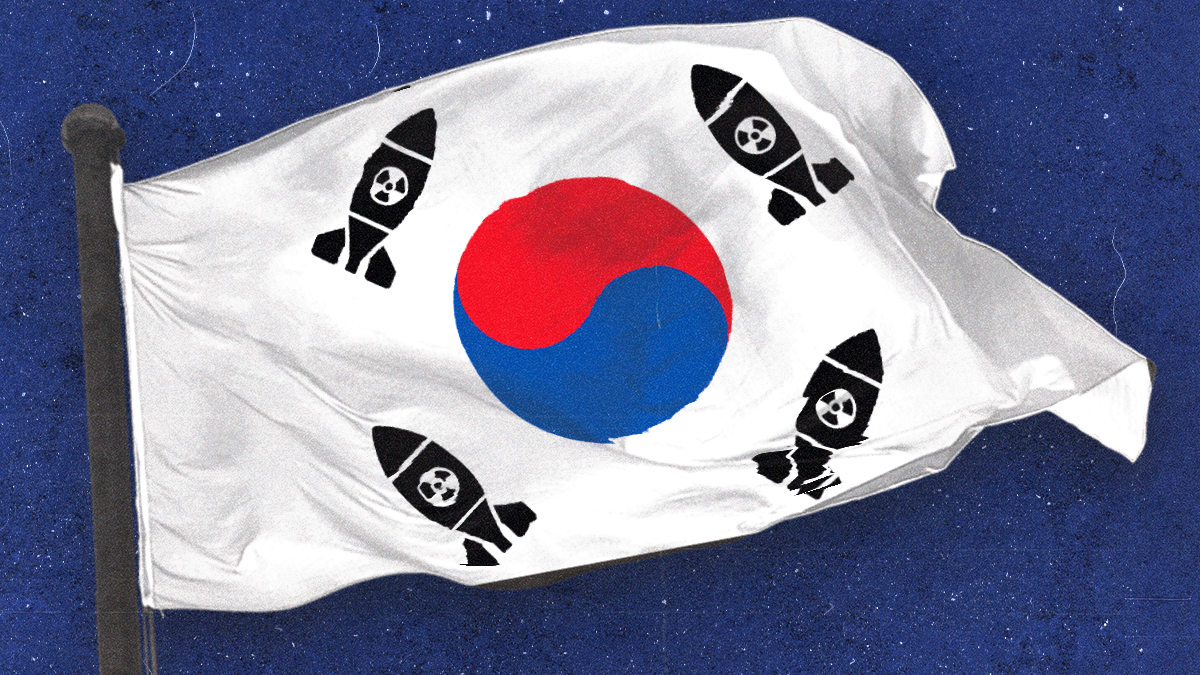April 26, 2023
The US and South Korea on Wednesday agreed to deploy American nuclear-armed submarines in South Korean waters for the first time in more than 40 years. Both governments framed the deal as “extended deterrence” from the US security umbrella against a North Korean nuclear attack.
As part of the agreement, Seoul committed to maintaining its non-nuclear status. But will it be enough to stop South Korea from flirting with the idea of developing homegrown atomic weapons?
In recent months, the once-fringe idea of Seoul getting the bomb has exploded into the mainstream conversation. President Yoon Suk Yeol has publicly raised the possibility, and media pundits are talking about it 24/7. What's more, almost three-quarters of South Koreans are in favor (although they worry equally about countering Xi Jinping and Kim Jong Un pushing the red button).
To understand why South Korea is considering getting its own nukes, picture this doomsday scenario: North Korea suddenly attacks South Korea, pushing the US to intervene. But then Kim threatens to nuke a mainland US city, which he can now reach with his newest ICBMs.
Would Washington go to bat for Seoul? And perhaps more importantly, would it do so before it's too late because it’s distracted by messy US domestic politics or another crisis like China invading Taiwan?
Most South Koreans don't want to take that chance. After all, the country's literal existence is on the line — even more so after Russia’s nuclear threats in Ukraine have awakened long-dormant fears of nuclear war.
Ukraine “has made the anxiety real,” says Jenny Town, a senior fellow at the Stimson Center and director of its 38 North Program. “Prior to that, I think we'd all gotten really comfortable with the notion that nuclear weapons would actually never be used again.”
But in her view, going nuclear comes with immense risks that far outweigh the benefits. For starters, nuclear parity doesn’t make anyone safer.
“What we see in South Asia [with India and Pakistan] is exactly the opposite,” Town explains. "It doesn't stop the provocations. It doesn't stop the adventurism. If anything ... they're both sort of still kind of egging each other on."
A nuclear-armed South Korea would also face severe external blowback. To restart the nuclear program it shuttered due to US pressure in 1975, the same year Seoul ratified the Nuclear Non-Proliferation Treaty, South Korea would first need to withdraw from the NPT. That's what North Korea did before testing its first atomic weapon in 2006 (and Iran has yet to do).
Walking away from the NPT would surely be met with sanctions, the extent and severity of which is unclear. But South Korea's booming economy would take a hit, as would all the soft power that Seoul has carefully built for years to become a global pop-culture heavyweight.
In short, going nuclear would hurt the likes of both Samsung and BTS.
The ripple effects would be felt by South Korea's neighbors. The move would likely trigger a nuclear arms race, with Japan next in line, while the Iranians would be even more emboldened to get the bomb. China won’t be happy — especially if the US ultimately decides to (reluctantly) accept South Korea as a nuclear power and maintains its security ties with Seoul.
Pyongyang, which boasts an arsenal of nukes that could turn all South Korean cities into flames within minutes, is unfazed by the hand-wringing in Seoul.
"The North Koreans don't necessarily believe the South Koreans would [build their own nuclear weapons] if the US was against it, given how they think about South Korea being a US puppet anyway," says Town. "But they know it's a useful discussion in order to bring discord in the alliance."
Will the US subs deal get the South Koreans to back off? On the one hand, America being able to respond to a North Korean attack within minutes instead of hours might give Kim some pause. But moving the nukes from Guam won't matter if America doesn't act fast enough to order a nuclear strike on Pyongyang.
Still, it’s a tough choice: Risk atomic annihilation or turn international pariah that no amount of “Squid Game” diplomacy can fix.More For You
- YouTube
In this Quick Take, Ian Bremmer breaks down the growing tensions between the US and Iran, calling it "the next area of potential large-scale conflict where President Trump is interested in changing the facts on the ground."
Most Popular
A flood victim stands at her flooded home after weeks of heavy rainfall in Boane District, Maputo, Mozambique, January 19, 2026.
REUTERS/Amilton Neves/File Photo
392,000: The estimated number of people displaced across Mozambique by recent rain-induced floods. Severe flooding in the southern African nation, as well as in South Africa and Zimbabwe, has killed over 100 people.
© 2025 GZERO Media. All Rights Reserved | A Eurasia Group media company.
